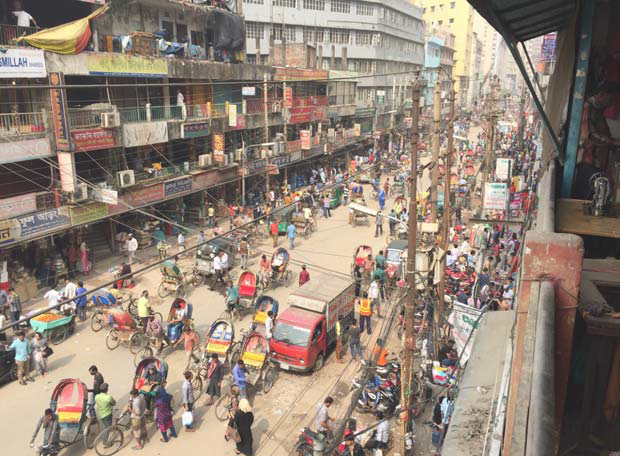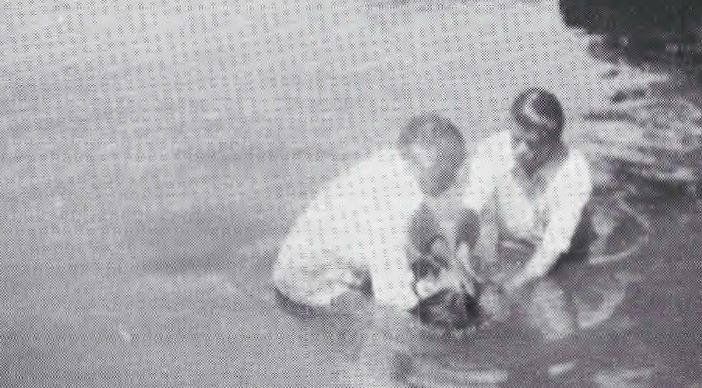Dhaka is a melting pot of humanity, an intriguing mix of past and present. It is a ‘super-metropolis’ and recognised as the most densely populated urban area in the world.
Initiation into Bangladesh sees one emerging from the airport to a relatively modern taxi. You are then hurtled along hastily constructed roads, closely surrounded by all manner of vehicles, to the ACBM mission flat located in Baridhara, a secure residential area, amongst the embassies of numerous countries, including Australia.
Along the side of the road are the sights one has only ever heard about: various sized wicker baskets balanced on the head, rubbish piled high, open fires burning under the beds of bitumen ready for barefooted workers to fill the incalculable number of pot holes.
The air is close even though January is the “best time of the year to visit”. Temperatures may be lower but the humidity reaches the dizzying heights of 70-80%. However, it is not the temperature that captures ones attention; it is the smog which hangs like a pale grey blanket and obscures anything past a couple of hundred metres in any direction.
However, all this is forgotten once we have arrived at our destination and meet the many waiting brothers and sisters. It is Friday, and Friday is the new Sunday for the next two weeks. As Bangladesh is significantly Muslim, the weekends don’t operate the same way they do in Australia. We arrive during the break between the morning study with interested friends and the Memorial Meeting. This is convenient, as they are waiting for an exhortation.
We settle in after everyone has departed and look forward to a good night’s sleep after the night on the plane. This hope, however, is short lived! Remember the seemingly throw-away line above, “Bangladesh is significantly Muslim”? That means calls to prayer, which begin at 5.20 a.m. There is a tower less than 500 metres away from the flat, with enough loud speakers on it to put most concert venues to shame. Let’s just say we heard the call to prayers.
Fellowship near and far
Not all ecclesias have their Memorial Meetings on Friday. Some ecclesias have them on Saturday and some on Sunday, so on Saturday we made the five mile (eight km) trip to Mirpur, where the ecclesia meets in a room in Brother Tosha’s house. Any trip here is an ordeal because of the traffic. What should be a 10 or 15 minute journey takes at least 45 minutes in the cramped conditions on the bus. We received a delightful welcome by the Sunday School children singing a couple of songs. We then had the Memorial Meeting with six or seven brothers and sisters.
Sunday saw us make a trip to Savar (pronounced Shavar) which is 19 miles (30 km) away. This took us at least 90 minutes and included made and unmade roads. From an Australian perspective the driving in Bangladesh is challenging: it suffices to say that the horn is used way too much and common sense way too little!
A school has been set up at Savar, serving the local community, in particular, the significant number of children who have not been able to attend school because of financial and other issues. Around 20-30 lower primary age children are catered for. After visiting the school, Brother Daniel (a local brother with fluent English) walked us around the immediate vicinity, showing us the numerous rice paddies and agricultural sights.
We were also able to call on a few houses where parents of students lived and we witnessed the poverty of many in this area. One house was made up of single rooms that would house a whole family with communal bathing areas and outside cooking areas. Parents work in garment factories for meagre wages just to survive. No wonder the Psalmist writes, “May he defend the cause of the poor of the people, give deliverance to the children of the needy, and crush the oppressor!”(Psalm 72:4). We witnessed the need for the fulfilment of these prophecies first hand.
Studies in studying
The next couple of days were spent preparing for the studies for the brothers planned for later in the week. Thursday night saw the first of the sessions with the brothers where Brother Cliff Wigg and Brother Andrew Dodson presented some sessions to assist the brothers enhance their skill in studying scripture. The idea was to focus on the importance of study and some techniques to get them started.
This was followed with a practical example based around 2 John; we chose this because we could put the whole book in the centre of an A3 page and then have them work around it recording information they had gleaned. The first night was a relative success with around five or six or brothers coming to spend the night with us. However this was short lived and, through some miscommunication, the next two planned evenings did not happen.
A few days later we were on the road again to the north of Dhaka and a city called Mymensingh. The journey took around four hours each way even though it was only just over 60 miles (100 km). In Mymensingh there are eight or nine young baptised brothers. None of these brothers were able to make it down for the sessions on study in Dhaka, so it was agreed that we would take it to them. A wonderful day was had with the brothers with the sessions on Bible study. A Memorial Meeting was also held with our young brothers who engaged in singing hymns for us (in Bangladeshi of course) and also in chairing sessions and participating in discussions. When the opportunity arrived for them to put the study techniques into practice with 2 John, they did so with enthusiasm and gladness!
The journey ends
After heading back to Dhaka and the now familiar Friday meeting, it was time to end our journey and head back to Australia. Our thanks go to Brother Phil and Sister Ros Kenny who were our hosts and guides. Phil and Ros have been actively involved in Bangladesh for many years and the brothers and sisters all respect them for their commitment, love and support. There were certainly many places we would simply not have been able to get to without their guidance.


